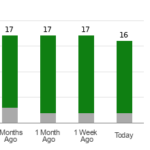Financial Fallout
China’s major companies faced a harrowing day in the market, as multiple factors converged to drag down their stock prices. Baidu’s lackluster financial report, alongside lingering concerns about China’s economic health and new regulatory interventions, sent shockwaves through the stock market, particularly impacting tech giants.
As the trading day unfolded, Baidu witnessed a 7.2% drop, Tencent Holdings slumped by 3.9%, and Alibaba took a hit, falling 3.4%. These declines underscore the vulnerability of China’s most prominent technology players in the current economic climate.
The Aftermath of Disappointing Results
Baidu’s fourth-quarter financials painted a grim picture for investors, with revenue reaching $4.9 billion, a marginal 6% increase year over year. However, the diluted earnings per American depositary share (ADS) plummeted by a staggering 50%, significantly missing analysts’ projections of $2.48 per ADS. This shortfall was exacerbated by increased spending on artificial intelligence, a double-edged sword that boosted revenue while eroding profits.
Despite some bright spots like the success of Baidu’s ERNIE AI product, the company faced challenges due to declining advertising revenue. Additionally, revenue growth at iQiyi, its streaming platform, lagged behind, further compounding its woes.
Looming Economic Crisis
Baidu’s disappointing earnings report is symptomatic of broader issues facing the Chinese economy. High unemployment rates among the youth, sluggish economic growth, and reduced consumer spending are casting a shadow over the country’s financial landscape. The ongoing turmoil in the real estate sector, exemplified by China Evergrande Group’s liquidation order, further exacerbates the economic downturn.
The real estate market meltdown, accounting for a significant portion of China’s GDP, adds to the economic woes. In addition, recent regulatory crackdowns on short-selling and quantitative trading strategies have instilled fear in investors, contributing to the widespread stock decline seen on Wednesday.
Navigating Uncertainty
Amidst the economic turbulence, investors are left grappling with uncertainty surrounding China’s financial future. The trio of companies, heavily reliant on consumer spending and a thriving economy, face an uphill battle as economic indicators continue to sour:
- Baidu’s business model mirrors that of Google, relying heavily on digital advertising revenue.
- Alibaba, a retail giant, relies on robust consumer spending to drive sales.
- Tencent’s revenue streams, anchored in advertising and consumer services, are intricately tied to discretionary consumer income.
Given the macroeconomic challenges and the bleak economic outlook, caution is paramount for investors considering these stocks. Despite attractive valuations – with Alibaba, Tencent, and Baidu trading at 14 times, 12 times, and 12 times earnings respectively, marked down significantly compared to the broader market – a thoughtful, long-term investment approach is advised in light of China’s economic fragility.
While a cautious approach is warranted, investors should tread carefully, acknowledging the heightened risks associated with investing in China. Diversification and a long-term perspective are crucial considerations when entering this volatile investment landscape.





